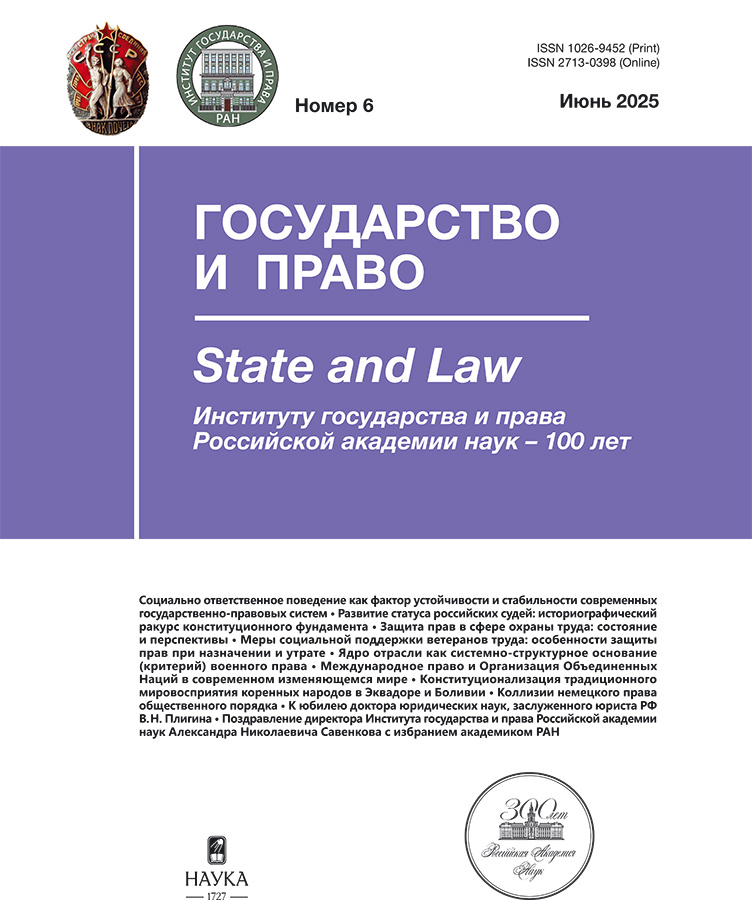Constitutionalization of the traditional worldview of indigenous peoples in Ecuador and Bolivia
- 作者: Vasilieva T.A.1
-
隶属关系:
- Institute of State and Law of the Russian Academy of Sciences
- 期: 编号 6 (2025)
- 页面: 163-173
- 栏目: Abroad
- URL: https://vestnik-pp.samgtu.ru/1026-9452/article/view/687396
- DOI: https://doi.org/10.31857/S1026945225060156
- ID: 687396
如何引用文章
详细
One of the characteristics of Latin American neo-constitutionalism is the promotion of alternative concepts of social development based on traditional indigenous ideas of the harmonious existence of people and nature. These approaches include respect for cultural differences and biodiversity, and the creation of a truly pluralistic state based on the principles of solidarity and participation. The traditional concepts of Pacha mama (Mother Earth or nature) and buen vivir (harmonious life) are enshrined in the constitutive acts and laws of Ecuador and Bolivia, and the legal approaches derived from them apply to the entire population.
全文:
作者简介
Tatiana Vasilieva
Institute of State and Law of the Russian Academy of Sciences
编辑信件的主要联系方式.
Email: tan-vas@mail.ru
Doctor of Law, Associate Professor, Chief Researcher at the Department of the Human Rights
俄罗斯联邦, 10, Znamenka St., Moscow, 119019参考
- Walsh C. The Plurinational and Intercultural State: Decolonization and State Re-Funding in Ecuador // RUDN Journal of Philosophy. 2012. No. 1. Pp. 103–115 (in Russ.).
- Acosta A. Buen Vivir. Rethinking the World from the Perspective of Buen Vivir. URL: https://base.socioeco.org/docs/dim_buen-vivir.pdf (accessed: 10.02.2025).
- Baldin S. I diritti della natura nelle costituzioni di Ecuador e Bolivia // Visioni LatinoAmericane. 2014. Num. 10. Pp. 25–39.
- Baldin S. The Concept of Harmony in the Andean Transformative Constitutionalism: A Subversive Narrative and its Interpretations // Revista General de Derecho Público Comparado. 2015. Núm. 17. Pp. 1–25.
- Bernal A. M. The Law and Politics of the “Good Life” in Ecuador: Sumak Kawsay, Extractivism, and the Naturalization of Sovereignty. Paper Prepared for the Latin American Studies Association Meeting, Thursday May 30th, 2013. Panel AFR101, “Naturalizing Social Contracts”. URL: https://www.academia.edu/10280891/The_Law_and_Politics_of_the_Good_Life_Sumak_Kawsay_Extractivism_and_the_Naturalization_of_Sovereignty_ (accessed: 15.02.2025).
- Cantle T. Interculturalism: The New Era of Cohesion and Diversity. Basingstoke; New York, 2012.
- Calzadilla P. V., Kotzé L. J. Living in Harmony with Nature? A Critical Appraisal of the Rights of Mother Earth in Bolivia // Transnational Environmental Law. 2018. Vol. 7. Iss. 3. Pp. 397–424.
- Dalla Riva L. I diritti della natura in Brasile ed Ecuador: un’analisi comparatistica tra costituzionalismo ambientale e buen vivir // DPCE Online. 2023. Vol. 58. Numero speciale – 2. Pp. 841–856. URL: https://www.dpceonline.it/index.php/dpceonline/article/view/1921 (accessed: 05.03.2025).
- Dolhare M. I., Rojas-Lizana S. The Indigenous Concept of Vivir Bien in the Bolivian Legal Field: A Decolonial Proposal // The Australian Journal of Indigenous Education. 2017. Vol. 45. No. 1. Pp. 19–29.
- Durán López M. E. Sumak Kawsay o Buen Vivir, desde la cosmovisión andina hacia la ética de la sustentabilidad // Pensamiento Actual. Universidad de Costa Rica. 2010. Vol. 10. No. 14–15. Pp. 51–61.
- Ferrari G. F. La comparazione tra necessità teoretiche e limitazioni pratiche // DPCE Online. 2020. No. 1. Pp. 821–825.
- Fuschi D. The Principle of Buen Vivir and the Constitutional Subjectivity of Nature // Ambiente Diritto.it. 2023. Anno XXIII. Fasc. Nо. 2. Pp. 483–505.
- Le sfide della sostenibilità. Il buen vivir andino dalla prospettiva europea / A cura di S. Baldin e M. Zago. Bologna, 2014.
- Pegoraro L. Il diritto pubblico comparato in cerca di una identità // DPCE Online. 2020. No. 1. Pp. 811–819.
- Pérez-Morón L.Y., Cardozo-Ruiz R. P. Construcción del Buen Vivir o Sumak Kawsay en Ecuador: Una alternative al paradigm de desarrollo occidental // Contribuciones desde Coatepec. 2014. Año XIII. Núm. 26. Enero-junio. Pp. 49–66.
- Schonthal B. The What, Where and How of Comparative Constitutional Law, after the ‘Southern Turn’ // Australian Public Law.
- Siems M. Identity Politics and Comparative Law // Maastricht Journal of European and Comparative Law. 2024. Vol. 30. Iss. 6. Pp. 719–725.
- Sólon P. The Rights of Mother Earth // The Climate Crisis. South African and Global Democratic Eco-Socialist Alternatives / Ed. by V. Satgar. Johannesburg, 2018. Pp. 107–130.
- Stancioli B. A Bundle of Rights and Pachamama: Visa Kurki’s Theory of Legal Personhood // Revus. Journal for Constitutional Theory and Philosophy of Law. 2021. Vol. 44. URL: https://journals.openedition.org/revus/6893 (accessed: 23.01.2025).
- The Oxford Handbook of Constitutional Law in Latin America / ed. by C. H. Mendes, R. Gargerella, S. Guidi. Oxford, 2022.
- Trembley A., Gagnon A-G. Multinational, multicuitural, intercultural, and plurinational federalism // Teaching Federalism. Multidimentional Approaches. Elgar Guides to Teaching / ed. by J. Kincaid, J. Leckrone. Cheltenham, 2023.
补充文件









